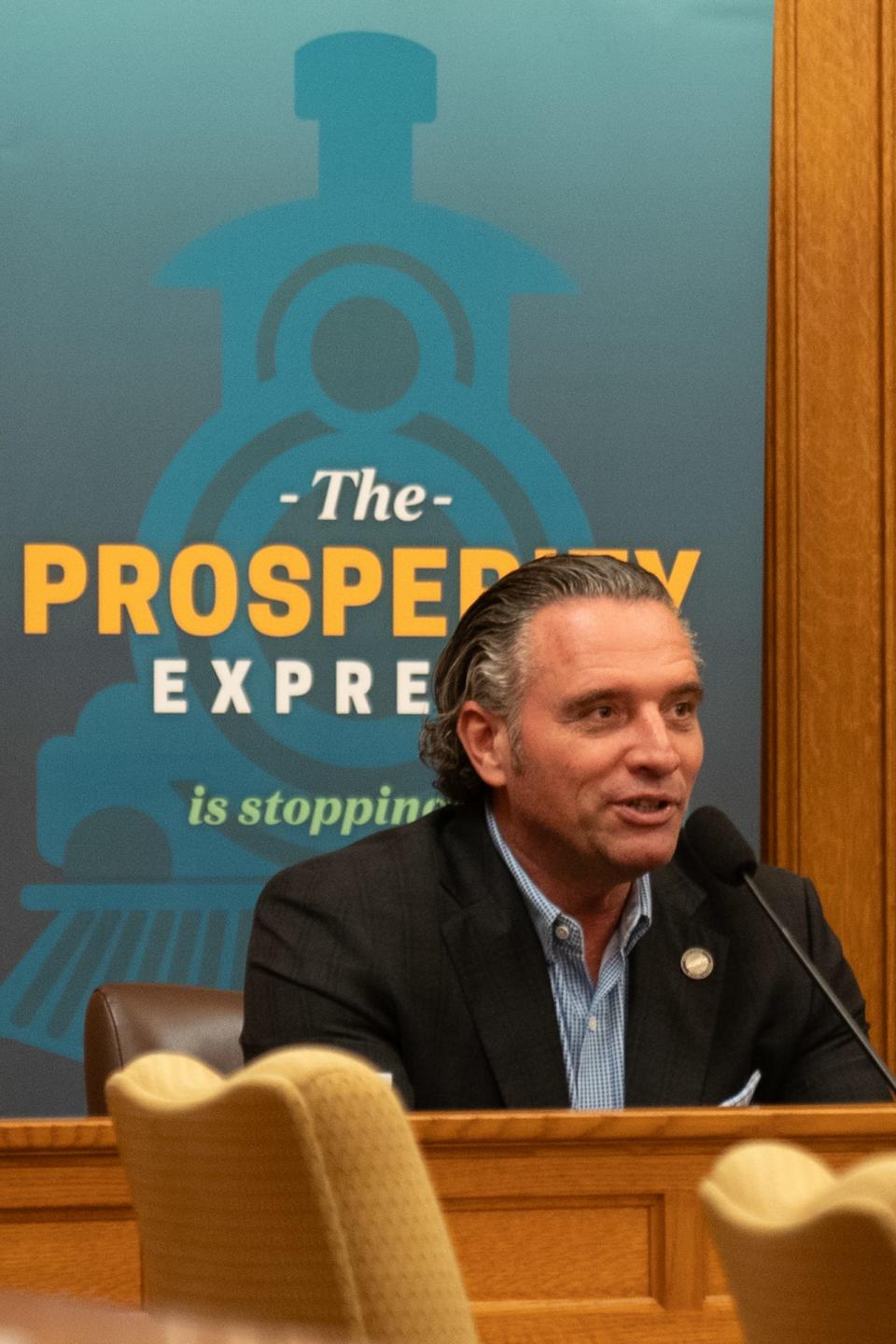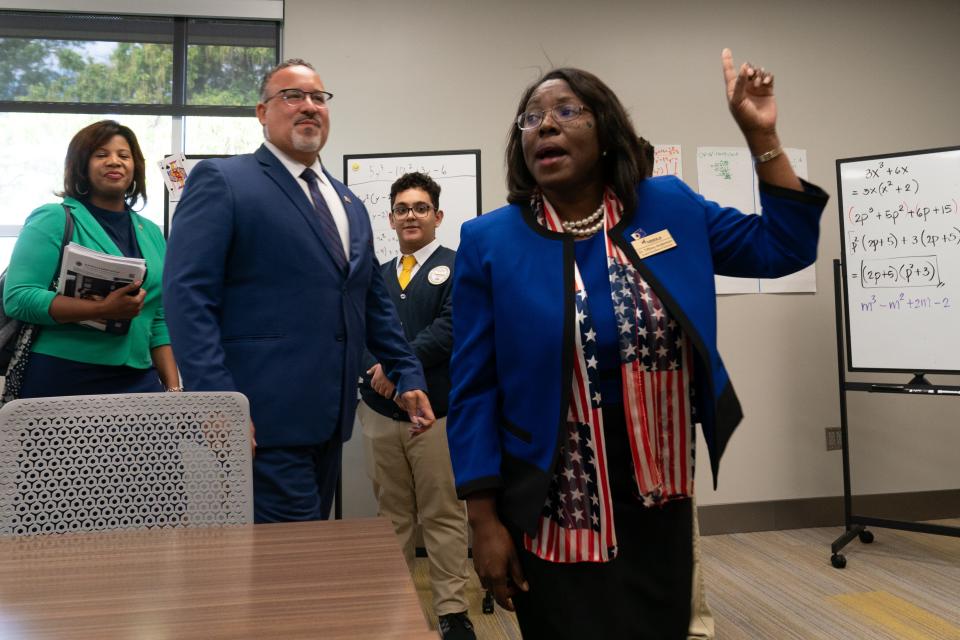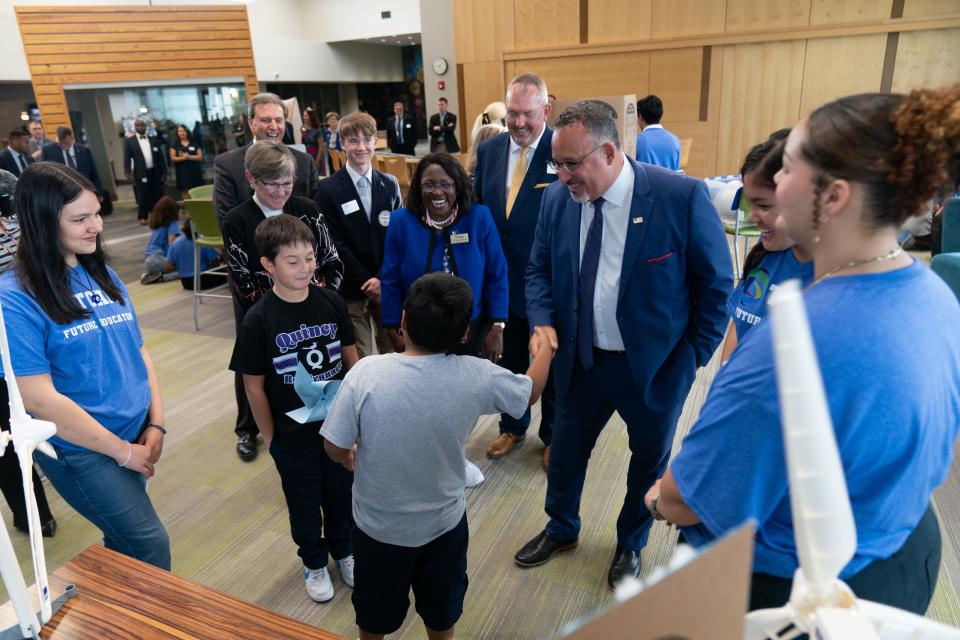School choice looms large as 2024 political battlefield. Here's what education leaders say
- Oops!Something went wrong.Please try again later.
- Oops!Something went wrong.Please try again later.
The top two Republicans in the Kansas Legislature vowed to renew the push for school choice next legislative session after failed attempts this year, even as the secretary of the U.S. Department of Education warns against such legislation.
Senate President Ty Masterson, R-Andover, said school choice is a top priority "because I think it's the top for our constituents."
He said a Hutchinson businessman approached him wanting to support school choice efforts because he is struggling to hire qualified workers. He told Masterson the public school graduates were "not well socialized."
"He is recruiting private and homeschooled kids versus, and that's tragic, because we need a strong public education system," Masterson said. "I don't know why the opposition seems to equate a parent having a choice with destruction of public education, because it is not the case. You can look around that country. There's many places that parents have vibrant choice and you still have strong public schools."

School choice programs can take various forms, such as vouchers, tax credit scholarships, education savings accounts and open enrollment.
U.S. Education secretary Miguel Cardona, who was in Topeka in September, warned against such legislation.
"Look, I'm not opposed to school choice," Cardona said. "I did not go to my neighborhood high school. I went to a technical high school. I made that choice, and I'm all in favor of parents having choice.
"But I'm not in favor of public dollars paying the tuition of wealthy families for private schools, because that money is going to come from the local neighborhood school where they're struggling to pay teachers a competitive salary, or they don't have reading support and their students are underperforming."
Republicans are split on school choice
Republican lawmakers are split on the issue, especially those from rural areas, and the GOP supermajorities dissipated when the issue was brought to a vote. The House barely passed a school choice plan last session in a 64-61 vote before it failed in the Senate.
"They're buying into the lie that somehow choice destroys public, and it's just not true," said Masterson, who joined House Speaker Dan Hawkins, R-Wichita, in speaking with reporters after a tax cut campaign event at the Statehouse.
Republican leadership has long vowed to keep trying, even though the legislation would face a veto by Democratic Gov. Laura Kelly.
Still, Hawkins thinks it can pass.
"It's a matter of when," he said. "It's going to happen. I mean, it's happening across the nation, and quite frankly, if you pay attention to polling out there. it's moving. There's more and more people who want school choice."
Kelly, who has focused her education policy on fully funding public schools, touted the education budget last month at Seaman Middle School.
"I will continue to invest in our public schools so that we can get all young people in Kansas, no matter where they are, the resources they need to succeed," she said.
Topeka superintendent defends choice within public schools

Topeka USD 501 superintendent Tiffany Anderson defended public schools.
"In public schools, you have choice," Anderson said. "In Topeka Public Schools, we have magnet schools, we have charter schools, we have a college prep academy. So we have choice right here in public schools. There's no need to leave beyond Topeka Public Schools to find other choices.
"And I think many public schools have choices right there that have a diverse array of offerings that you really can't find in many other places."
Likewise, Cardona suggested school choice legislation is detrimental to public schools.
"I'm all in favor of choice," he said. "But I'm in favor of also making sure we have well resourced schools with highly qualified teachers with enough reading support, literacy support, math support, mental health support and college pathways for our students. That's what we're focusing on."
Anderson said public schools are required to accept all students.
"Unlike a private school, we really can't keep certain students out," she said. "Anybody that shows up — no matter your income level, no matter what you have or don't have, your disability — we take every student that comes through our door. So being able to invest in public schools currently is really the route to really lead to the path of serving all students and all students well.
"I will say that if vouchers or any other program were put in place that took funds from public schools, further reducing the available funds we have to support students, it's really up to us as educators to again still remove silos and work with our other partners to serve all students well."
Education secretary wants to boost teacher pay

Anderson and Cardona, who took part in event promoting efforts to increase diversity among teachers amid a national teacher shortage, told reporters afterward that policymakers should take a look at teacher pay.
"There are attacks on diversity across our country, which is why we need a workforce in education that understands what they're walking into and how important it is at this time in our country's history to get into the profession," Cardona said. "Look, there are folks that want to make names for themselves by trying to divide public education or attack and critique it. We're here trying to raise the bar."
He said more competitive salaries would help keep qualified teachers instead of relying on substitute teachers, which he suggested would improve the percentage of students reading at grade level.
"Across the contrary we see deliberate attacks on public education," he said. "We see folks trying to shut down public schools or lessen support for public schools at a time where students need more, not less."
Salaries are one way to show respect, said Anderson, who also urged the Legislature to remove barriers to entering the teaching profession while creating new pathways.
"We really have to continue to show our legislative body how they can continue to invest in the teaching profession," she said. "You know, Kansas ranks rather low in pay for teachers and the nation overall ranks low compared to some other professions that are public service professions."
Jason Alatidd is a statehouse reporter for the Topeka Capital-Journal. He can be reached by email at jalatidd@gannett.com. Follow him on Twitter @Jason_Alatidd.
This article originally appeared on Topeka Capital-Journal: Kansas Republicans vow to renew legislative fight for school choice
